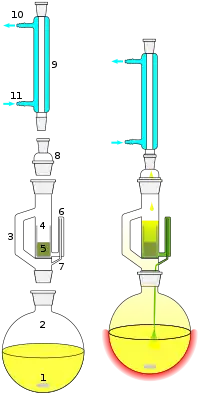Soxhlet extractor
English

Soxhlet extractor (with condenser above and flask below)
Etymology
Invented in 1879 by Franz von Soxhlet.
Pronunciation
- IPA(key): /ˈsɒkslət ɪkˌstɹæktə/
Noun
Soxhlet extractor (plural Soxhlet extractors)
- (chemistry) A piece of laboratory apparatus consisting of a glass reservoir that sits over a lower flask (containing a boiling solvent) and under a condenser; a sample contained in a paper thimble is placed in the reservoir and soluble materials are continually extracted by the warm solvent and transferred to the lower flask via a siphon.
- 2006, Thomas Pynchon, Against the Day, Vintage, published 2007, page 264:
- Amid a gleaming clutter of burners and spectroscopes, funnels and flasks, centrifugal and Soxhlet extractors […] , serious girls with their hair in snoods entered numbers into log books
Further reading
 Soxhlet extractor on Wikipedia.Wikipedia
Soxhlet extractor on Wikipedia.Wikipedia
This article is issued from Wiktionary. The text is licensed under Creative Commons - Attribution - Sharealike. Additional terms may apply for the media files.